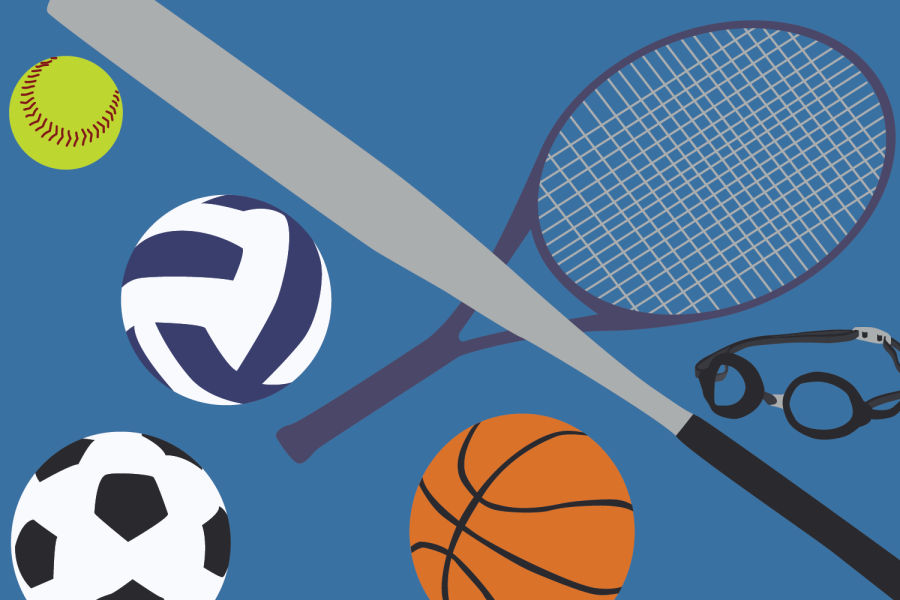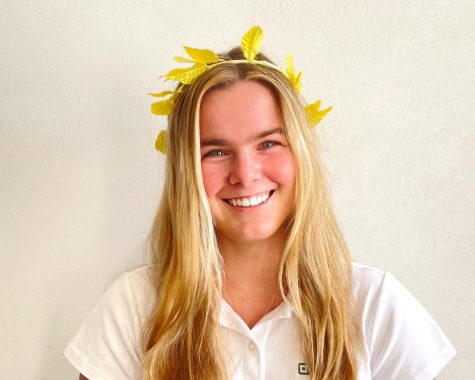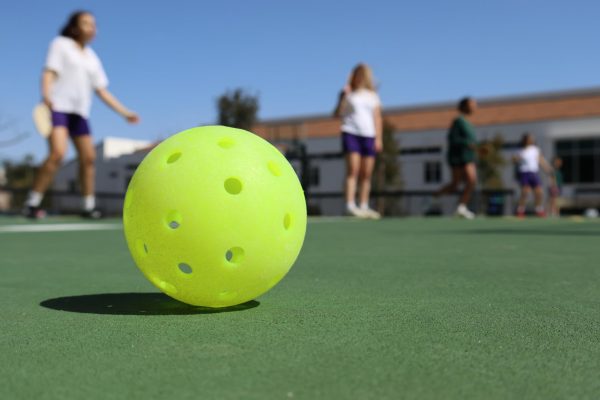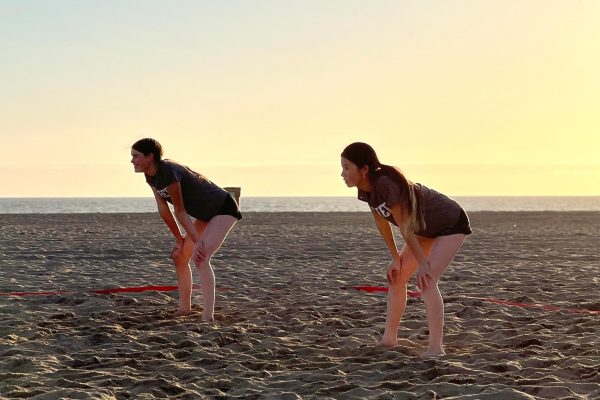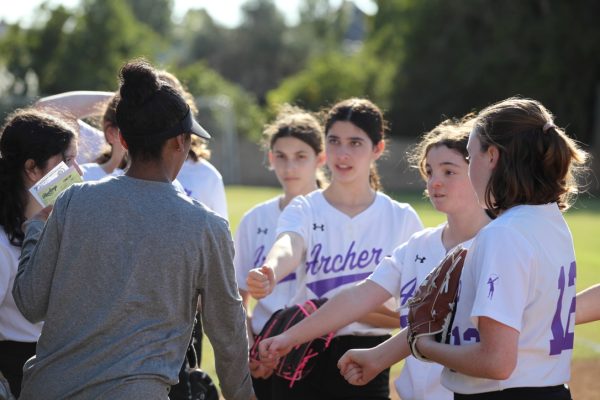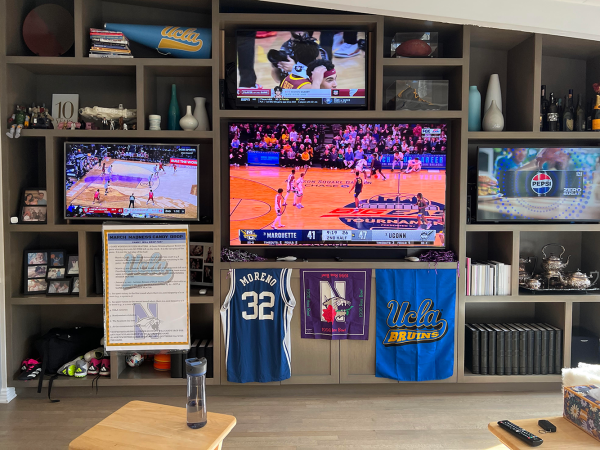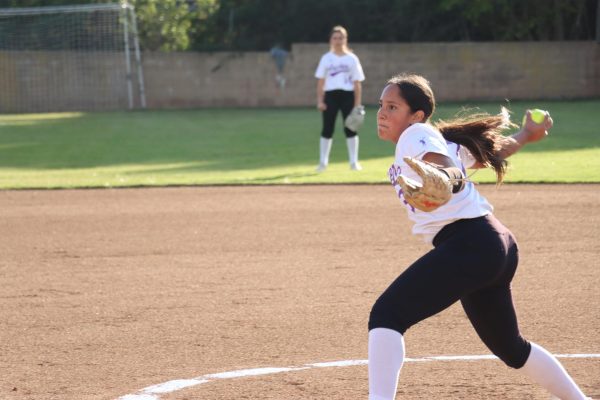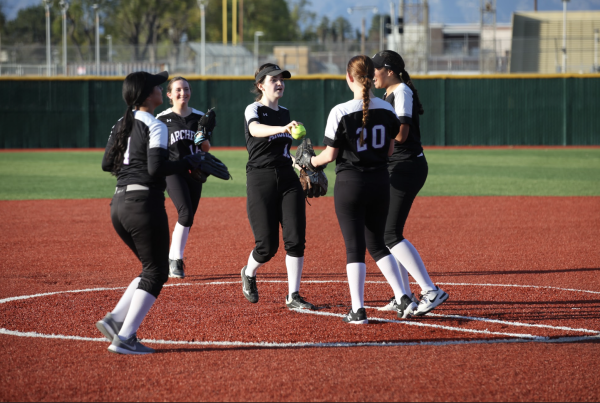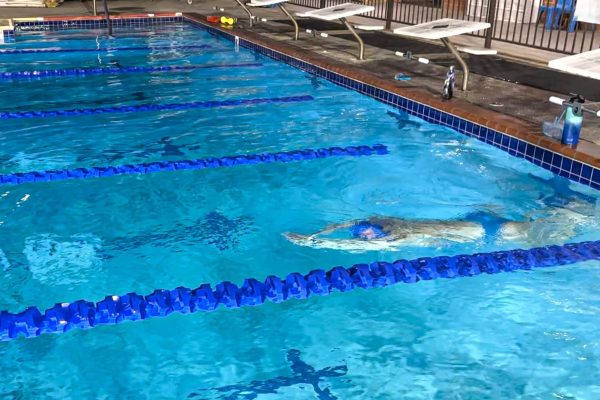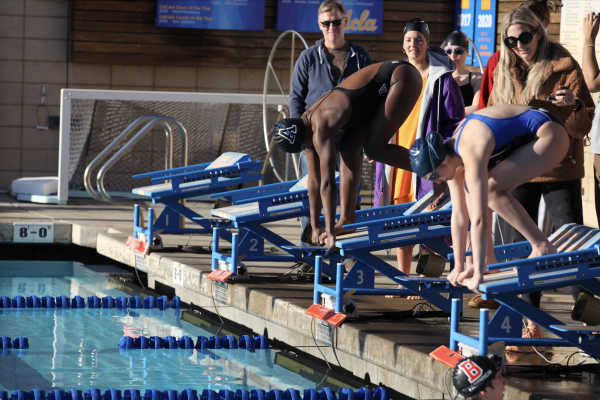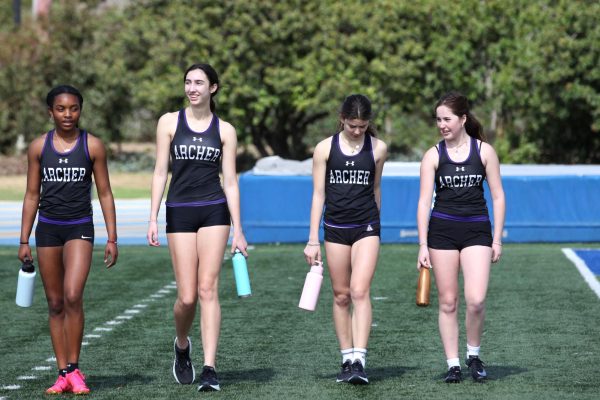How Archer’s multi-sport athletes ‘just show up’
Photo credit: Graphic Illustration by Molly Solowitz
With various options inside and outside of Archer, some athletes choose all of the above. “Don’t limit yourself to one sport,” senior Presley Sacavitch said. “Soccer and softball, completely different skills, but that doesn’t mean that I can’t try it.”
March 31, 2022
Shooting a basket, scoring a goal, hitting a home run and finishing a race. While most athletes say that they focus on one of those moves, others juggle many throughout the year. Whether it be soccer and softball, or tennis and swim, multi-sport athletes within Archer draw on the diversity of skill in each sport to strengthen the others. Both physically and mentally, these athletes work to balance a year of school and sports.
Senior Presley Sacavitch plays soccer and softball. She played soccer throughout her childhood and picked up softball as a freshman at Archer. Given that the sports require different skills, Sacavitch said she has found similarities within their team dynamics.
“[In soccer], I’ve always loved the team dynamic. It’s very athletically demanding and I just love the team, especially at Archer,” Sacavitch said. “And then softball — I actually started in ninth grade at Archer — so it’s a new love, and again, I love the team dynamic. I love when your teammates are cheering you on when you’re up to bat, or when you’re calling stuff and doing defense.”
Ali Aragon is a senior tri-sport athlete. She runs cross county in the fall, plays soccer in the winter and then joins the track team in the spring. Aragon said that the transition from a contact to individual sport was difficult, but playing multiple sports has helped strengthen her athletic skills overall.
“I think the transition from soccer to running is often difficult because soccer is more aggressive and about scoring a goal or getting to the soccer ball,” Aragon said. “But running — there’s a specific technique to it. So I think learning how to run in a way that’s different from my natural running form in soccer can be difficult. But I also think … I feel prepared and more in shape to do either sport.”
Senior Nina Salomon also plays three sports: tennis, soccer and swim. She played all three in her childhood and picked them back up in high school. Along with Sacavitch and Aragon, Salomon said the bond is what keeps her coming back to each team. She also said that playing sports helps to improve her mental health.
“You get to share what you’re feeling with your teammates and you’re not alone in that,” Salomon said. “And it’s also really good for mental health and also physical health. That’s something that keeps me in sports because it’s really good to have a break from schoolwork and stressing. It’s a time where you can just focus on your sport and have fun … Each of my sports are so different, but I love doing them all.”
Sacavitch said that a lot of the thinking behind playing multiple sports was to strengthen skills even out of season. By doing this, she is able to take strengths from soccer and capitalize off of those in softball, namely her speed.
“I started with soccer and soccer is all cardio. You’re running, you’re moving, you’re thinking critically and you have to react fast. And so when I joined softball … I was talking to a friend and they’re like, ‘You’ve never done a hand sport before so you should do left-handed for softball because you’re really fast. And because you’re on the left side of the plate, all you need really need to do is hit [the ball] and if you can run fast, you can get to first base,'” Sacavitch said. “And so for me, soccer has really helped me with that because if I just make contact with the ball, I’m sprinting — I’ve definitely got that stamina and speed from soccer.”
Salomon also spoke to the throughline of her sports experience. She said there is an overlap of footwork and overall physicality between certain sports. She said there are unexpected parallels between soccer and swim.
“[In] tennis and soccer, the footwork is what overlaps for me. Because in tennis, you have to have amazing footwork to get to the ball and move, and it’s the same in soccer, you have to have amazing footwork. So I think those two overlap really well,” Salomon said. “And then for swim, that one’s a little different … And so I think it’s all about you staying in shape. You’re working on your footwork and then that’ll help your movement in the water for swim.”
I think like definitely, I think it’s also taught me like a lot of stuff like throughout the years of like commitment and things like that, like you made a commitment to be on the team. You have to stick to that.
— Presley Sacavitch ('22)
Overall, there is a sense that playing multiple sports goes beyond athletic abilities. With the stresses of being a student-athlete, Sacavitch said there is a heightened level of focus.
“I think mentally, I’ve noticed significant changes when I’m in season and when I’m not in season,” Sacavitch said. “And that’s why I like playing multiple sports because it keeps me active. And regardless if I’m really bad at it or if I’m playing or not, it keeps me active, and even over the summer when I’m not working out, you know the difference. All athletes know when you’re in season you’re focused because you’re managing a lot.”
As she prepares to leave for college, Aragon said she’s going to bring certain skills that she learned from being a multi-sport athlete with her. She said it’s those concepts that she’ll carry into her future.
“I think sports have helped me stay disciplined,” Aragon said. “So in college, I will continue to stay active and be aware of my health in general like what I’m eating or how often I’m getting up to walk throughout the day.”
Salomon also listed skills that she has developed throughout the years and hopes to bring to college. She said skills like commitment, communication and maintaining an active lifestyle will be important in her future.
“It’s taught me a lot of stuff throughout the years about commitment — you made a commitment to be on the team — you have to stick to that,” Salomon said. “And so it’s about honoring that. And also it’s helped with communication skills because you have to communicate with your teammates and with your coaches. So I think that’s also another aspect — adding on to keeping fit, eating right and things like that.”
After years of balancing school and sports, Salomon said that it ultimately comes down to showing up. That sentiment is one she hopes to continue living by and one she hopes future athletes will take to heart.
“Just show up, be there,” Salomon said. “If you can’t give 110 [percent] every single day that’s fine. As long as you’re showing up, you’re showing your coach that you’re putting in the effort to be there. And it makes the coach and the rest of your team members know that you want to be there and that you’re putting in an effort to be on this team.”





![Freshman Milan Earl and sophomore Lucy Kaplan sit with their grandparents at Archer’s annual Grandparents and Special Friends Day Friday, March 15. The event took place over three 75-minute sessions. “[I hope my grandparents] gain an understanding about what I do, Kaplan said, because I know they ask a lot of questions and can sort of see what I do in school and what the experience is like to be here.](https://archeroracle.org/wp-content/uploads/2024/03/grandparents-day-option-2-1200x800.jpg)













































